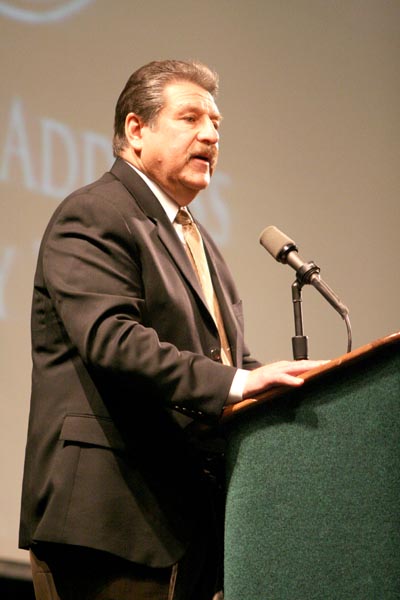Gonzalez’s address brings hush picket line

President:
January 30, 2007
President Alexander Gonzalez’s annual SpringAddress speech put into plain words the challenges the president has faced and the accomplishments the university achieved.The speech was given in the Sac State ballroom amidst some controversy and polite protest last Thursday.Gonzalez started his address by recognizing the challenges that Sac State has met. He called the challenges “externally driven” and “budgetary in nature.”The president recognized the problems that Sac State is currently facing with a sense of optimism.With regard to the current budgetary cutbacks Sac State students are seeing, Gonzalez acknowledged that financial aid is going “flat” because the funding in general is going down. The president called for new ideas needed for higher education, even going as far as to say that radical approaches may be necessary.He failed to mention what those approaches might entail.Gonzalez wanted to put to rest any questionsabout his intentions. He wanted to “de-mystify” the process of budgeting by creating a budgeting committee.During this portion of the speech quiet hissing could be heard among protesters from the California Faculty Association, comprised of faculty, staff and students who were situated in the back of the auditorium.The 4 percent pay raise given to California State University top-paid executives, including all 23 campus presidents, CSU Chancellor Charles Reed and his four deputies is the icing on the cake in the CFA’s eyes when added to the pay and contractnegotiations it has been in for more than 20 months.Their own contractual issues are also at the root of their frustrations.The timing of the raise couldn’t be worse for the president.CFA members have been trying to negotiate new salary terms with Gonzalez for some time. The CSU, not the president, approves a systemwide contract with the union. That has not deterred CFA from expressing its uneasiness with the president and the CSU Board of Trustees.In a recent letter to the Trustees, the CFA shared its concern that “additional student fee increases, coupled with a shortfall in state financial aid grants, could have an adverse impact on student enrollment.”The heckling did not seem to deter the president, saying that it was their business to protest if they chose to.”I understand,” he said after his speech. “It’s their right to protest, and they can express their dissatisfaction.”Gonzalez was not afraid to confront these problems.”Obviously, we could go on with our list of challenges,” Gonzalez said. “But they are not insurmountable, nor should we focus on them too much.”As the budget picture improves, we will be positioned to take advantage of better times, not just to roll with them.”As the speech progressed, Gonzalez gave praise to many of the positive advances Sac State made since he became president in 2003.The president gave accolades to the advances Professor of Civil Engineering Eric Matsumoto has made in his research in pre-cast concrete construction and his good work ethic with his students.Gonzalez also acknowledged the outstanding achievements Sac State’s women’s volleyball team made during its season last fall.”Our women’s volleyball team had another outstanding year,” Gonzalez said. “They won more matches this season than they have since 1995.”The speech couldn’t avoid the real problem the university is facing, though: The budget.”Today’s reality is that our financing remains largely in the hands of the governor and the legislature,” Gonzalez said.He said he was heartened to see that financial aid was once again on Congress’ radar screen.”Nevertheless, we continue to face obstacles with state and federal funding,” he said.Gonzalez called for the campus community to participate in planning for the future of Sac State by working in conjunction with the Strategic Planning Council. He explained that the Council will work very closely with the University Budget Committee.In planning for the budget, Gonzalez said the CSU system is planning an update to Cornerstones, the program that set key priorities for the university.A new initiative, called “Access to Excellence,” will establish specific program objectives, set priorities and guide resource use over the next several years.”Students, faculty, staff, administrators, alumni and community partners will be asked to address a common set of themes and questions,” Gonzalez said.”This campus will be very active and make sure that our faculty and staff voices are heard,” he said.
Josh Staab can be reached at [email protected]




























































































































